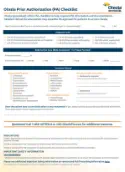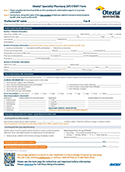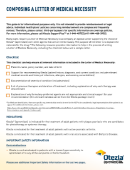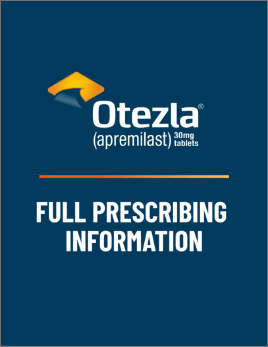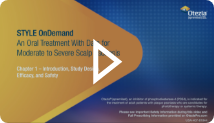IMPORTANT SAFETY INFORMATION
Contraindications
Otezla® (apremilast) is contraindicated in patients with a known hypersensitivity to apremilast or to any of the excipients in the formulation
Warnings and Precautions
Hypersensitivity reactions, including angioedema and anaphylaxis, have been reported during postmarketing surveillance. If signs or symptoms of serious hypersensitivity reactions occur, discontinue Otezla and institute appropriate therapy
IMPORTANT SAFETY INFORMATION
Contraindications
- Otezla® (apremilast) is contraindicated in patients with a known hypersensitivity to apremilast or to any of the excipients in the formulation
Warnings and Precautions
- Hypersensitivity: Hypersensitivity reactions, including angioedema and anaphylaxis, have been reported during postmarketing surveillance. If signs or symptoms of serious hypersensitivity reactions occur, discontinue Otezla and institute appropriate therapy
- Diarrhea, Nausea, and Vomiting: Cases of severe diarrhea, nausea, and vomiting were associated with the use of Otezla. Most events occurred within the first few weeks of treatment. In some cases, patients were hospitalized. Patients 65 years of age or older and patients taking medications that can lead to volume depletion or hypotension may be at a higher risk of complications from severe diarrhea, nausea, or vomiting. Monitor patients who are more susceptible to complications of diarrhea or vomiting; advise patients to contact their healthcare provider. Consider Otezla dose reduction or suspension if patients develop severe diarrhea, nausea, or vomiting
- Depression: Carefully weigh the risks and benefits of treatment with Otezla for patients with a history of depression and/or suicidal thoughts/behavior, or in patients who develop such symptoms while on Otezla. Patients, caregivers, and families should be advised of the need to be alert for the emergence or worsening of depression, suicidal thoughts or other mood changes, and they should contact their healthcare provider if such changes occur
- Plaque Psoriasis: Treatment with Otezla is associated with an increase in depression. During clinical trials in adult patients with moderate to severe plaque psoriasis, 1.3% (12/920) of patients reported depression compared to 0.4% (2/506) on placebo. Depression was reported as serious in 0.1% (1/1308) of patients exposed to Otezla, compared to none in placebo-treated patients (0/506). Suicidal behavior was observed in 0.1% (1/1308) of patients on Otezla, compared to 0.2% (1/506) on placebo. One patient treated with Otezla attempted suicide; one patient on placebo committed suicide
- Psoriatic Arthritis: Treatment with Otezla is associated with an increase in depression. During clinical trials, 1.0% (10/998) reported depression or depressed mood compared to 0.8% (4/495) treated with placebo. Suicidal ideation and behavior was observed in 0.2% (3/1441) of patients on Otezla, compared to none in placebo-treated patients. Depression was reported as serious in 0.2% (3/1441) of patients exposed to Otezla, compared to none in placebo-treated patients (0/495). Two patients who received placebo committed suicide compared to none on Otezla
- Behçet’s Disease: Treatment with Otezla is associated with an increase in depression. During the clinical trial, 1% (1/104) reported depression or depressed mood compared to 1% (1/103) treated with placebo. No instances of suicidal ideation or behavior were reported in patients treated with Otezla or treated with placebo
- Weight Decrease: Monitor body weight regularly; evaluate unexplained or clinically significant weight loss, and consider discontinuation of Otezla
- Plaque Psoriasis: Body weight loss of 5-10% occurred in 12% (96/784) of adult patients with moderate to severe plaque psoriasis treated with Otezla and in 5% (19/382) of patients treated with placebo. Body weight loss of ≥10% occurred in 2% (16/784) of adult patients treated with Otezla compared to 1% (3/382) of patients treated with placebo. Body weight loss of 5%-10% occurred in 12% (19/163) of pediatric patients with moderate to severe plaque psoriasis treated with Otezla compared to 2.5% (2/80) with placebo. Body weight loss of ≥ 10% occurred in 1% (1/163) of pediatric patients treated with Otezla twice daily compared to 0% (0/80) of patients with placebo. Closely monitor growth (height and weight) in Otezla-treated pediatric patients. Pediatric patients who are not growing or gaining weight as expected may need to have their treatment interrupted
- Psoriatic Arthritis: Body weight loss of 5-10% was reported in 10% (49/497) of patients taking Otezla and in 3.3% (16/495) of patients taking placebo
- Behçet’s Disease: Body weight loss of >5% was reported in 4.9% (5/103) of patients taking Otezla and in 3.9% (4/102) of patients taking placebo
- Drug Interactions: Apremilast exposure was decreased when Otezla was co-administered with rifampin, a strong CYP450 enzyme inducer; loss of Otezla efficacy may occur. Concomitant use of Otezla with CYP450 enzyme inducers (e.g., rifampin, phenobarbital, carbamazepine, phenytoin) is not recommended
Adverse Reactions
- Plaque Psoriasis: The most common adverse reactions (≥ 5%) are diarrhea, nausea, upper respiratory tract infection, and headache, including tension headache. Overall, the safety profile of Otezla in adult patients with mild to moderate plaque psoriasis and pediatric patients with moderate to severe plaque psoriasis was consistent with the safety profile established in adult patients with moderate to severe plaque psoriasis
- Psoriatic Arthritis: The most common adverse reactions (≥ 5%) are diarrhea, nausea, and headache
- Behçet’s Disease: The most common adverse reactions (≥ 10%) are diarrhea, nausea, headache, and upper respiratory tract infection
Use in Specific Populations
- Otezla has not been studied in pregnant women. Advise pregnant women of the potential risk of fetal loss
Please click here for the full Prescribing Information.
INDICATIONS
Otezla® is indicated for the treatment of:
- Adult patients with plaque psoriasis who are candidates for phototherapy or systemic therapy
- Pediatric patients 6 years of age and older and weighing at least 20 kg with moderate to severe plaque psoriasis who are candidates for phototherapy or systemic therapy
- Adult patients with active psoriatic arthritis
- Adult patients with oral ulcers associated with Behçet’s Disease



